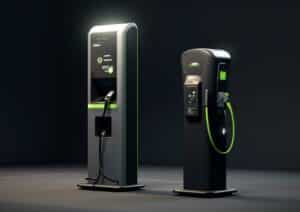Welcome to a fervent discussion on electric vehicle (EV) fleet management—a field that combines the prospect of cutting-edge technology with our urgent need for sustainability. Here, where the rubber meets the road, we explore the intersection of duty and innovation. When we speak about EV fleet management, we’re talking about a robust, data-inflected system of oversight and coordination for a fleet of electric cars. These vehicles could serve various functions, from corporate carpool fleets to delivery and courier services across cities, nations, and continents.
In a world increasingly focused on environmental preservation, EV fleet management represents our collective effort to trim our carbon footprint while retaining the degree of mobility modern life demands. At its core, this novel approach to travel aims to gleefully replace the internal combustion engine with a more eco-friendly alternative – electricity.
The Importance of Zero Emissions
Before we dive into the intricacies of EV fleet management, it’s essential to understand why it is of pivotal importance. We’re all more ecology-conscious these days, and for a good reason. The scientific consensus is unequivocal—human activities are increasing the concentration of greenhouse gases in Earth’s atmosphere, leading to a warming planet and a host of damaging knock-on effects. Among these gases is carbon dioxide (CO2), a large portion of which originates from burning fossil fuels for transportation.
This is where the concept of zero carbon emissions comes into play. A zero-emission EV vehicle (ZEV) doesn’t directly emit tailpipe pollutants like CO2, nitrogen oxides, or other greenhouse gases during vehicle operation. The move towards these vehicles—and, by extension, EV fleet management—isn’t merely a response to the escalating environmental crisis; it is, arguably, one of the few viable solutions we have at our immediate disposal.
From climate change to air pollution, the impact of greenhouse gases on our health and environment is profound and far-reaching. Transitioning to electric vehicles allows us to combat these issues head-on, dramatically reducing or eliminating these harmful emissions.
An all-electric fleet reduces dependency on fossil fuels, moving us closer to a zero-emission future—a goal that is globally recognized as necessary to slow down climate change and limit its most devastating effects. In this crucial context, electric vehicles, and by association, EV fleet management, come riding to the rescue. By adopting and developing practices around this concept, we’re not just revolutionizing how we move but ensuring the possibility of movement for future generations.
What is EV Fleet Management?
Electric Vehicle (EV) Fleet Management is a holistic system of managing all the electric vehicles in a fleet, which could range in scale from a handful of cars for a small business to thousands of vehicles for significant corporations or governmental bodies. The management includes strategic planning, organizing, and controlling entire fleet operations to optimize functionality, minimize costs, and reduce environmental impact. It has aspects such as acquisition, charging, maintaining vehicles, route planning, and retiring vehicles when the time is right.

While traditional and EV fleet management shares some standard aspects, such as logistical coordination and scheduling, EV fleet management also includes the unique challenges and opportunities electric vehicles present. For instance, it accounts for monitoring and managing charge levels across the fleet, identifying and planning routes around charging infrastructure, understanding unique maintenance needs, and often employing dedicated software to streamline these tasks.
The Transition to EV Fleet Management
The shift from traditional to electric vehicle fleet involves several crucial steps and anticipates a series of challenges, highlighting:
Steps in Transitioning:
- Operational Assessment: Determine the functional requirements of your current fleet, including daily travel distances, vehicle usage patterns, and availability, and match these with corresponding electric vehicle models.
- Investment: Investment in an EV range suitable for your fleet needs, considering EVs’ higher initial procurement costs.
- Charging Infrastructure: Evaluation and overhaul of existing charging infrastructure or creation of new one involves decisions on the types and numbers of charging stations, their placement, and their power sources.
- Training: Implement a training program for staff on EV operations, maintenance, understanding battery lifecycles, maximizing charge times, and efficient route planning.
Anticipating Challenges:
- Upfront Capital Cost: Electric vehicles tend to have higher procurement costs than their traditional counterparts, posing a significant initial investment.
- Infrastructure Needs: Transitioning to an EV fleet demands adequate charging infrastructure, which might require considerable investment and foresight.
- Range Anxiety: Though diminishing, the concern about an EV’s battery running out before reaching a charging station remains significant during the transition.
- Need for Training: EVs demand different skills and knowledge for their operation and maintenance, necessitating comprehensive training for the staff.
While these challenges require careful planning and consideration, they are counterbalanced by significant gains in terms of cost-effectiveness, sustainability, and overall operational efficiency in the long run.
Benefits of EV Fleet Management
Electric Vehicle (EV) Fleet Management offers a variety of impressive benefits, from reducing operational costs and carbon footprints to boosting a company’s reputation for sustainability. The benefits can be divided into three categories: environmental, economic, efficient, and reputational.
Environmental Benefits of Electric Vehicle Fleet Management
The substantial reduction of greenhouse gas emissions is EV fleets’ most significant environmental benefit. EVs emit zero tailpipe pollutants, directly contributing to cleaner air and healthier communities and helping to combat climate change. Besides, EVs are often more efficient than vehicles that run on fossil fuels, further contributing to sustainability goals.
Economic and Efficiency Benefits of Electric Fleet Management
- Reduced Costs: Even though EVs have a higher initial purchase price, the total cost of ownership over the vehicle’s lifespan can be less than that of conventional internal combustion engine vehicles. This is due to lower fueling and maintenance costs. EVs require less maintenance because they have fewer moving parts, no exhaust system, less need for cooling, and use brake pads less aggressively, thanks to regenerative braking.
- Government Incentives: Many governments offer numerous incentives for companies that move towards more sustainable practices, including tax credits, grants, and cost-sharing opportunities for transitioning to EVs, installing charging infrastructures, and more.
- Increased Efficiency: Modern EV management systems utilize advanced software solutions that provide real-time insights into vehicle performance, maintenance needs, driver behavior, and more, all of which can lead to considerable efficiency gains.
Reputational Benefits of Fleet Electrification
In the court of public opinion, companies that demonstrate a serious commitment to reducing their environmental impact tend to fare better. Transitioning to EV fleet management sends a strong message about a company’s commitment to sustainability and corporate social responsibility. It results in an enhanced brand image and improves customer and employee loyalty. For companies that rely heavily on their fleet for business, having an all-electric fleet can set them apart from competitors and promote them as a forward-thinking, eco-friendly organization.
In conclusion, while the transition to EV fleet management requires some inversions, realizable benefits are convincing — it improves environmental sustainability, cuts down long-term economic costs, enhances operational efficiency, and elevates the company’s reputation.
Tools and Techniques in EV Fleet Maintenance and Management
Effective EV fleet operation doesn’t have to be an uphill battle. Many tools, strategies, and software have been developed to help navigate the unique challenges of managing electric vehicles. These technological investments are as significant as the vehicles themselves — directly influencing an EV fleet’s efficiency, cost-effectiveness, and long-term viability.
EV Fleet Management Tools and Software
- Telematics EV Management Systems: These use GPS and onboard diagnostics to record and map exactly where a fleet vehicle is and how fast it travels. Cross-reference this with how a car behaves internally. Modern EV fleet management software can also report on energy usage and efficiency, providing a real-time overview of EV performance.
- Charging Management for EV Fleets: These systems help manage EV charging by scheduling charging during off-peak hours to save costs, predicting charging needs based on route planning, and ensuring efficient use of EV charging stations.
- Maintenance Software: Unlike traditional cars, electric fleet vehicles require different practices for care and maintenance. EV-specific maintenance software can notify when a vehicle requires servicing based on mileage, usage, or time intervals, ensuring optimal vehicle performance and lifespan.
- Route Planning Software: This is especially crucial for EV fleet management. These systems consider vehicle charge level, charging station location, and route energy demands to provide the most efficient routes.
Data Analytics and Live Tracking in Fleet Management

Data analytics and live tracking take fleet management to a new level. With data analytics, EV fleet managers can review and analyze their fleet’s historical and real-time data to identify trends, make predictions, and make evidence-based decisions. They can get detailed insights into driver behavior, power usage, running costs per mile, predict maintenance needs, and more. This enables them to enhance efficiency, reduce costs, and extend the life of their vehicles, ultimately improving the overall management of the fleet.
Similarly, live tracking allows for real-time oversight of each vehicle’s location and status, giving managers immediate information about their fleet’s operations, which can be crucial in making time-sensitive decisions. With this feature, they can also ensure driver accountability and security, timely deliveries, and accurate service times.
To sum it up, the smart use of appropriate technological tools and software, paired with data analytics and live tracking, can streamline EV fleet management’s operational and strategic aspects, vastly increasing its efficiency and effectiveness.
Future of EV Fleet Management

As electric vehicle technology advances rapidly, so will the tools and best practices for managing EV fleets. In the not-so-distant future, we can anticipate significant advancements in battery technology, offering longer ranges and shorter charging times, making EVs more practical and attractive for fleet operations.
Further enhancements in telematics, data analytics, and route optimization software will contribute to an even smoother, more efficient, and cost-effective fleet management. The proliferation of autonomous driving technology and connected vehicles will also revolutionize fleet management, allowing businesses to operate 24/7 and enabling more efficient driving, which can extend battery life.
Advancements in battery technology, promising longer ranges and quicker charging times, necessitate a robust network of accessible charging solutions. Tiger Electric’s role in installing and managing efficient charging stations is critical, as these stations form the backbone of reliable fleet operations, ensuring that EVs are consistently operational and ready for service.
Conclusion

EV fleet management offers significant benefits like reduced greenhouse gas emissions and lower operational costs, enhancing efficiency and company reputation. However, it requires strategic planning and smart technology use, including telematic systems, charging platforms, and data analytics. Challenges like upfront costs and charging infrastructure are manageable with careful planning. Including services like those offered by Tiger Electric, specializing in EV charger installation and maintenance, can be crucial in this transition.
Ultimately, transitioning to EV fleets is a pivotal environmental step, urging businesses to act now for a sustainable future and healthier communities.







